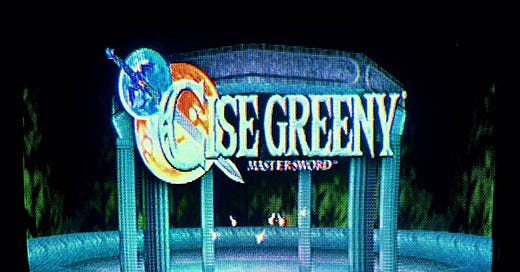Perhaps the most definitively millennial hipster dad things about me are that I own an OG GameBoy Color, have a re-issued Super Nintendo mini console and — as a modern day splurge — bought myself a Switch last year (I know, they’re going to be phased out soon and predominantly market themselves to an audience of children, but I wanted one).
I’m glad I trusted my gamer’s intuition and got one, though. By the grace of the 16- and 32-bit gods, I pocketed my Switch on the exact week that — unbeknownst to me — Zelda: Tears of the Kingdom was slated to debut. As someone who grew up gaming in the 90s and 00s but hadn’t picked up the proverbial sticks for a decade-and-some-change, TotK felt at once familiar and mystic, otherworldly and organic.
Link’s quest, of course, remains unaltered from previous iterations of the Nintendo franchise: the hero must find Zelda and save her by defeating Ganondorf while splitting the wigs of ghoulish hordes and wielding the Master Sword around Hyrule’s unbelievably diverse geographic terrains for weeks-on-end. And yet, this version of Zelda — boldly cinematic and infinitely endless in its aerial, underworld, and mid-world forms — felt like, for lack of a better phrase, being immersed in the breath of the wild in ways I’d never experienced as an RPG head and action-adventure veteran. Despite the latest, sexy additions to Link’s medieval arsenal — namely, having an extraterrestrial’s arm with the ability to fuse items and teleport through surfaces — the game’s general dynamics retained a certain old-school spirit of brute puzzlework, text-only character dialogues, and that eternal feeling of salvation after leveling up your weapons and accruing enough red heart containers to slay a three-headed Gleeok. Simply put, the old concept felt brand new to me again.
That’s what it feels like listening to MASTER SWORD, a recent audio export from the ever-slick Corona, Queens emcee, Cise Greeny. He’s a fresh-sounding but nostalgia-guided newcomer with a monkish adherence to his New York City predecessors. And his heroic quest on MASTER SWORD is evident from the jump: deliver armor-piercing life lessons and Zelda-heavy mysticism from a Royal Guard Bow-turned-microphone over jazzy boom bap classics. Nothing earth-shattering. Nothing internet-breaking. Just lyricism being pummeled into your dome.
Tracks like “SHEIK MEETING/DESTINY TEMPLE” — the opening cut on the 18-track project — and “GERUDO’S FORTRESS” — produced by Boston’s Garçon D'or who, when he’s not cooking up fire instrumentals, apparently specializes in mashing up popular beats with odd lyrics and sound effects on TikTok — showcase Cise Greeny at his best as he kicks a laidback pluralism of thought and a Buddhist-like serenity while loosely referencing all-black Tim Duncan sneakers and moonlit meditations. Like many of Queens’ most lethal, flag-bearing swordsmen of yore — think Action Bronson, Homeboy Sandman, Phife Dawg, Nas — Cise Greeny’s approach is a tactical mix of playfully timed and aggressively poetic, punctuated by his multisyllabic bursts of lyrical weaponry. Rather than finding a trendier wave to ride in this era of post-regional internet caricatures and algorithm-driven hype (I just watched the latest Lil Yachty & Ian video to premiere on Lyrical Lemonade, for example), Cise Greeny’s verbal arcade-combos evince a certain studiousness, a kind of love for disciplined traditionalism that I find endearing, if not comforting, in this warped age of fakeness.
The cool orator and part-time producer steadily builds momentum with each rhyme without over-exerting his capacity or veering sideways: “Masterminded, master swordsmen, PSG [Proper Spiritual Growth record label] like a thousand / samurai horsemen, do it like a Nike endorsement… special forces inside Gerudo’s Fortress.” It’s not the clickbait-y, meme-driven content or forced experimentalism that so many of his contemporaries seem content in regurgitating. Instead, he’s just a Queensman rocking a red North Face and bright mint snapback beneath the 7 Line with a few rhymes in his pocket.
Earlier this year, the emcee also dropped METAL HEAD — with a stripped down Halo-esque robo character (presumably metal head) gracing the album’s cover art. What the album lacks in glamorous presentation it more than compensates for in its nourishing wholesomeness. Once again, Cise Greeny leans into video game lore — with references to Metal Slug and the Zora tribe from Zelda — while gliding over lightly distorted, grainy bangers that, at times, evoke a kind of deep-underworld, futuristic aerosol fever dream akin to Company Flow’s Funcrusher (peep “BLUE BEAM” featuring Micah Write).
On every project he’s christened, Cise Greeny seems locked in on keeping new-age backpack rap (and analog video games) in the general consciousness, whether intentionally or indirectly. Having just garnered acclaim from Pitchfork’s Alphonse Pierre as one of the best mixtapes of 2024 — and with nine full-length releases under his belt since debuting in 2020 — this rapper’s Queensborough crusade is upon us. And he’s taking us all back with him to a simpler time of nerd-loving raps, “Where We Always Used to Be.”





This was awesome 🤩